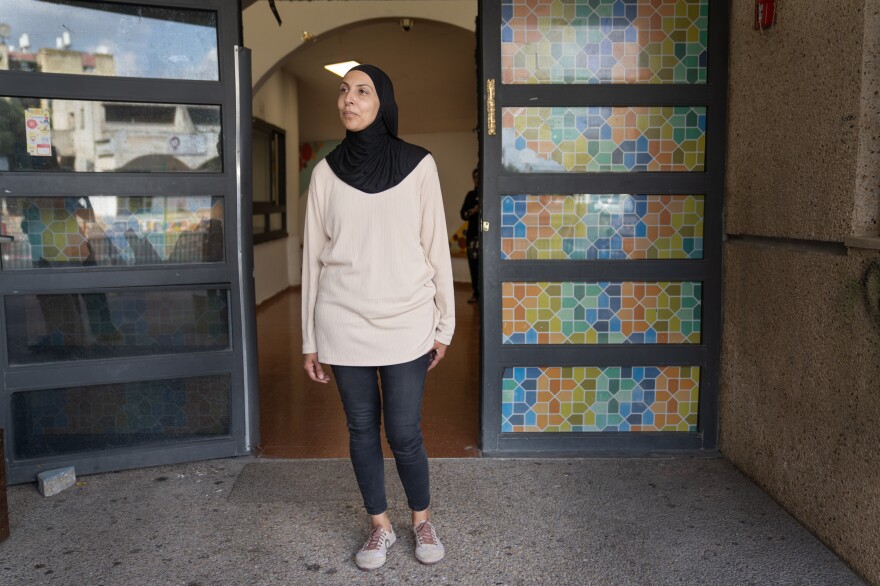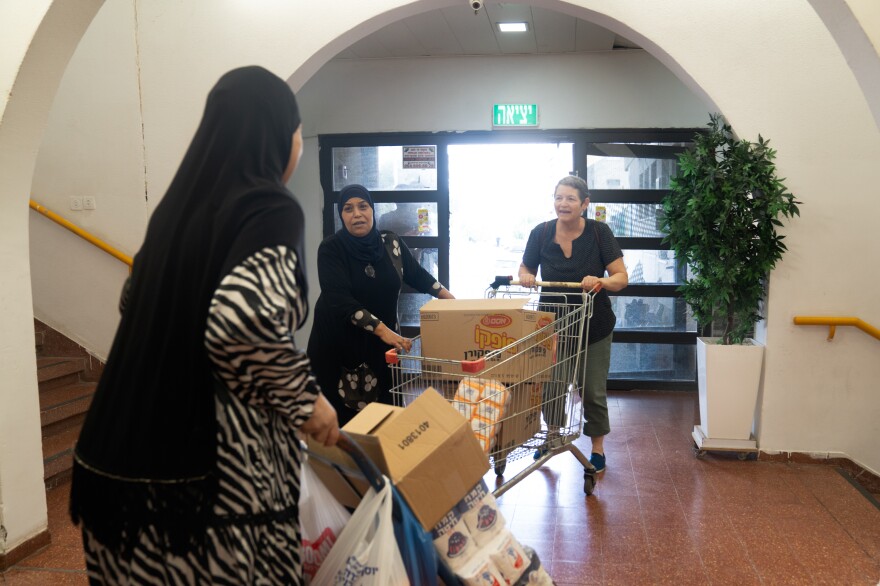LOD, Israel — Hanadi Essa Basel has a lot on her plate as the manager of the Mosaic Community Center in Lod, a city of some 80,000 in central Israel. It has transformed its operations to respond to the war: There are psychologists on staff and workshops for young children to help them process emotions in a time of trauma. She called it an "emergency room" for anyone affected — "Jewish and Arab communities alike."
But when asked about her mission in this moment, as Israel mourns the more than 1,400 people killed in this month's unprecedented attack by Hamas militants and prepares for a major ground invasion of the Gaza Strip, Basel described something more fundamental: "It's very important for us to go through this period unharmed and safely."

Lod is a mixed community, where Arabs and Jews live side by side, sometimes in the same building. About 20% of Israel's population is composed of Arabs — or Palestinian citizens of Israel. During the last major escalation in the conflict between Israel and Hamas, Lod was the site of violent clashes between Jewish and Palestinian citizens of Israel, and the emotional scars haven't fully healed. "It is hard for me to share, to be honest with you," Basel said, "because it brings out bad and painful memories for both communities in the city."
Now, tensions are even higher. Activists pushing for peace, a shared society and solidarity between Jews and Arabs say that speaking out has become dangerous — even for simple expressions of condolence for civilian deaths in Gaza, where the Hamas-run health ministry said Israeli airstrikes had killed nearly 6,000 people as of Tuesday.
"It's an incredibly, incredibly tough time," said Nadav Shofet, an organizer with Standing Together, a grassroots organization of Jewish and Palestinian citizens of Israel. Shofet, who is Jewish, said that people in Israel are scared and that there's "this feeling of having to hunt down people who say anything that sympathizes with people in Gaza or strives towards peace."

In the city of Haifa last week, police broke up a rally in support of Gaza. "I am giving you precise instructions: zero tolerance for any incident of incitement — not by a nurse, not by a doctor, not by a singer," said Israel's police commissioner, Kobi Shabtai, in a video posted to the Arabic-language TikTok channel for the police. "Anyone who wants to sympathize with Gaza is welcome to get on a bus and go there."
After the left-wing journalist Israel Frey recited the Jewish mourner's prayer for dead civilians in Gaza, he says a right-wing mob attacked his home and threatened his wife and children. In a video released on social media last week, he said he was in hiding. "They went after me because I talked about the need for empathy and prayer for Gaza's children," he said.

Against that backdrop, Shofet and Standing Together's national co-director Rula Daood arrived at the community center in Lod with a group of volunteers. The main event was a donation drive for people suffering economically from the war — many shops and restaurants have been closed and tourism has dried up. About a dozen people — some wearing headscarves and modest clothing, others in V-neck T-shirts and open-toed shoes — chatted in a mix of Arabic and Hebrew as they packed up boxes with basic groceries.
The activists also brought a pile of posters to put up in town, if it felt safe to do so. The day prior, Standing Together activists in Jerusalem tried to put up stickers with a message of Jewish-Arab solidarity, and it didn't go well. "The police just came in and arrested two of our activists," said Daood.
The activists in Lod wanted to make a statement, but without putting volunteers or the community center staff at risk. Daood is a Palestinian citizen of Israel who lived in Lod for six years, including during the 2021 unrest, so she understands the potential for danger: "You would see people just in the streets with guns and wanting to have some kind of — any clash."

Even small gestures of collaboration between Jews and Arabs like this donation drive are potentially fraught in this moment. "My husband — he doesn't like me to come here," said 64-year-old Smadar Tzimmerman, another volunteer. She's Jewish, and she's retired now, but used to work in Lod as an art therapist, including in Arab schools.
She has friends who do peace work, and talking with them fills her with hope, but she admitted that most of Israel doesn't share her views. Two weeks after the Hamas attack, the anger is still palpable. "When I go to a funeral where everyone is grieving and says, 'Let's kill them,' I will not speak my mind, you know? I just came to comfort them in their sorrow," she said.
But Tzimmerman still hopes for peace and thinks that building relationships between Jews and Arabs is the only way to achieve it, even if her husband calls her "a naive woman."
"Being kind to each other, to know each other — it's not such a difficult thing to do, if you are willing to do it," she said. "The problem is, our leaders are not willing to do that."

It's not only Jewish Israelis who view this approach to peace as wishful thinking. Myada Abu Khaled, a Palestinian citizen of Israel, is an educator and volunteers with children at the community center in Lod. "No need now for 'Let's do things together,'" she said, "rainbow things and unicorns and so on. It won't help. We should be realistic."
Abu Khaled has spent her entire life around Jews — "I speak Hebrew as a mother tongue," she said — and she has students serving in the Israeli army. "I'm afraid even to ask about them," she said, wiping away tears.

She broke down as she recalled a Zoom call earlier that morning with a student in one of her college classes. Friends of the student were killed at the Nova music festival. "I could feel her hatred upon me," Abu Khaled said. "I really don't judge her, and I really understand her. But still, when I finished the Zoom, I just collapsed. I fell apart."
Abu Khaled said she had given up on the idea of a society of Arab-Jewish cooperation. "I saw that people are not interested, so you can't force it," she said.
As the donation drive wrapped up and the boxes of food were sealed with packing tape, Daood decided not to risk hanging posters around town after all. A local activist told her that a far-right group had learned Standing Together was in Lod, and Daood didn't want to provoke an altercation, arrests or worse. "We don't want to make any problems for anybody right now," she said.

The contents of the poster at issue? Simple white text on a purple background in Hebrew and Arabic: "We'll get through this together."
The slogan may not sound controversial, but right now it's a message that many in Israel don't want to hear.
So, for now, Daood and Standing Together are working quietly to make connections between neighbors. "The real work," she said, "is after this war is over."
Local producer Sawsan Khalife contributed to this story. contributed to this story
Copyright 2023 NPR. To see more, visit https://www.npr.org.



